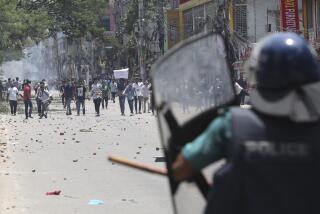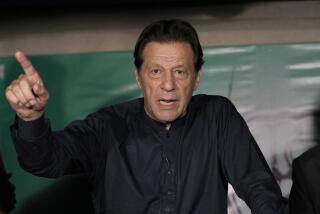Pakistan bans protests in political crackdown
ISLAMABAD, PAKISTAN â Pakistani authorities rounded up hundreds of lawyers, activists and political rivals and banned demonstrations in two key regions Wednesday ahead of planned protest rallies, a move that sets an already shaky government on a path of confrontation with its strongest opponents.
The crackdown by President Asif Ali Zardariâs pro-Western government could backfire, analysts warned, undercutting reconciliation among democratic groups after years of military rule and alienating moderates within his own ruling party.
âIt appears that more hawkish elements are in control of the government,â said Tariq Rahman, an analyst with Quaid-i-Azam University in Islamabad, the capital. âAnd while I donât think the military will intervene directly given public feeling, it strengthens their hand.â
The government detained or placed under house arrest more than 400 people in the eastern province of Punjab, by some accounts, and dozens of others in Islamabad and other major cities. Hundreds more are in hiding. Punjab, an opposition stronghold, is Pakistanâs political heartland, with about 60% of the nationâs 170 million people.
Gatherings of more than four people were declared illegal in Punjab and in Sindh, a province that contains the countryâs largest city, Karachi.
Critics said some of the laws under which human rights and political activists were detained date to late 1800s British rule.
Tahira Abdullah, a human rights activist based in Islamabad, said she was awakened at dawn by police who broke down her door and took her to jail. She was released after a few hours.
âI live alone, Iâm a middle-aged woman, a peace activist,â Abdullah said. âAnd they need a truck full of police, another car and two female officers to take me away? Theyâre in panic-driven mode. Itâs a foolish, disproportionate use of force.â
Tariq Mehmood, a former Supreme Court justice and government critic, said he got a tip early Wednesday that police were coming to raid his house. At first he didnât believe it, he said, but ultimately opted to flee.
Four hours later, police woke up his family looking for him. âFor the time being, Iâm on the run,â he said by telephone. âIâll have to see what happens.â
The seeds of the current crisis were planted last month when the Supreme Court banned leading opposition figure Nawaz Sharif and his brother Shahbaz from elected office. The two, who are critical of U.S. policy in the region, have seen their popularity rise as Zardariâs has declined.
Using their base in the Punjab region, the brothers responded by ratcheting up public pressure against Zardari, including accusations that the president engineered the court ban to safeguard his power.
The pair also joined lawyers and other critics in mobilizing anti-government rallies in Quetta, Rawalpindi and Lahore planned for today, to be followed by a âlong marchâ -- actually a drive -- to the capital and a sit-in. With many of the leaders on the run, however, it remains to be seen whether the march will take place.
The government put shipping containers, concrete barriers and armored personnel carriers along major routes into Islamabad in an effort to block entry.
Sherry Rehman, the governmentâs information minister, told the media Wednesday that the detentions and protest bans were necessary to protect life and property that would be threatened by irresponsible people taking to the streets.
The political turmoil comes as nuclear-armed Pakistan faces growing militant activity -- including last weekâs attack on the Sri Lankan cricket team in Lahore -- and rising Islamic fundamentalism in the Swat Valley about 100 miles northwest of Islamabad.
The country is also struggling with deeply entrenched economic problems, growing strains with India and the problem of sizable portions of its northwest falling under Taliban and Al Qaeda control.
Zardari, the widower of assassinated onetime Prime Minister Benazir Bhutto, was elected president in September on a wave of sympathy over his wifeâs death.
Lawyers and political opponents have called on Zardari to live up to his pledge to reinstate high court judges fired by former President Pervez Musharraf, who as a military leader seized political power in 1999 in a bloodless coup and suspended many democratic rights.
They also say Zardari has reneged on a promise to unwind many presidential powers Musharraf put in place.
âHe benefited from our democratic struggle, but once he gets into the presidential house of power, he forgets,â Mehmood said.
--
More to Read
Sign up for Essential California
The most important California stories and recommendations in your inbox every morning.
You may occasionally receive promotional content from the Los Angeles Times.










